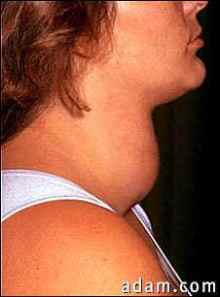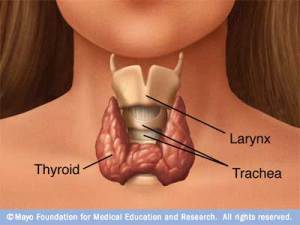The thyroid is an endocrine gland located in the front of the neck, overlying the wind pipe (trachea) and food pipe (oesophagus). It produces the hormones triiodothyronine (T3) and thyroxin (T4) which circulate in the blood. These hormones control the metabolism and function of our body cells. Thyroid Stimulating Hormone (TSH), a hormone
produced by the pituitary gland in our brain, regulates the production of T3 and T4. T3 and T4, in turn, exert a negative feedback effect on the TSH production.
Iodine is the main constituent of the thyroid hormones.
Thyroid disorders arise either because of abnormal production of thyroid hormones (excess or under), abnormal structure or congenital developmental disorders.
Goiter refers to an enlargement of the thyroid gland. Common causes fo r goiter are iodine deficiency and auto immune thyroid disea se wherein antibodies, which slowly destroy the thyroid, are produced in the body. The symptoms of thyroid dysfunction are very subtle and can be easily overlooked. Hence a high index of suspicion is required to diagnose these disorders.
Hypothyroidism refers to reduced activity of the thyroid gland leading to underproduction and low levels of T3 and T4 hormones in the blood. The TSH levels rise due to the negative feedback effect of the low hormone. This can occur because of primary damage to the thyroid gland by antibodies or because of drugs like lithium, amiodarone or iodine containing solutions. Very rarely, some pituitary tumors cause low TSH levels and thereby reduce the production of T3 and T4. This is called secondary hypothyroidism.
Hypothyroidism is more common in females. The usual symptoms of hypothyroidism (uncontrolled) include slowing of metabolism with tiredness, lethargy, cold intolerance., weight gain, mood changes, dry coarse skin, hoarse voice, heavy menses, infertility, anemia, high cholesterol etc. In children hypothyroidism leads to short stature and low IQ.
This is diagnosed by checking blood hormone levels which show low normal T3 and T4 with elevated TSH in primary hypothyroidism and a normal TSH with low T3 and T4 in secondary hypothyroidism. Tests like anti-microsomal or anti-thyroglobulin antibodies establish the cause of the problem.
Treatment is replacing the deficient hormones by thyroxine tablets (T4 tablets eg: Eltroxin, Thronorm, Thyrox). The dose required is 1.6-1.8 mcg/kg to be taken every day in the morning on an empty stomach. Drugs like iron, calcium and antacids interfere with thyroxine and need to be spaced out. Treatment is usually lifelong except in rare circumstances. Yearly monitoring of TSH is required to decide the appropriate dose for each patient.
Hyperthyroidism refers to over activity of the thyroid leading increased T3 and T4 levels in the blood. TSH levels are low (below 0.3mIU/L). This can occur usually because of stimulating antibodies or rarely due to pregnancy, drugs and some ovarian tumors.
It can affect both sexes but is more common in males. The usual symptoms of uncontrolled hyperthyroidism include weight loss, palpitations, increased sweating, tremulousness, prominence of eyes, heat intolerance etc. In addition to these, silent diseases like irregular heart rate, heart failure, osteoporosis and worsening of diabetes can occur. Cigarette smoking can worsen this state.
Diagnosis is by detecting high normal T3 and T4 with low TSH levels in blood. Further investigations like technetium or radio-iodine scans may be useful to distinguish between thyroiditis (temporary hyperthyroidism, no treatment required) or Graves’ disease (definitive therapy required).
Treatment.
There are various options like drugs, surgery and radioactive iodine depending on various factors like age, goiter size, eye complications, recurrent disease etc. In addition, beta-blockers for controlling symptoms and calcium and Vit. D supplements should be given to prevent osteoporosis.
Nodular goiter:
Refers to benign growth of thyroid in patches leading to formation of nodules (single/multiple). The thyroid enlarges slowly and most common symptoms are of compression of the trachea or the esophagus. Thyroid hormone levels are usually normal. An ultrasound, a technetium scan or fine needle aspiration cytology (FNAC) of the nodule may be required.
Treatment options are watchful observation, surgery or radioactive iodine ablation depending on the clinical condition.
Thyroid malignancies are rare and usually seen with single nodules. Risk factors are extremes of age, large size and a rapid increase in size. The prognosis is good if detected early. Surgery followed by radioactive iodine therapy and thyroxin supplementation lifelong is the usual protocol of treatment.
Thyroid disorders in Pregnancy:
Thyroid disorders can lead to infertility and miscarriages in women. Thyroid hormones are essential for normal brain development in the fetus. The developing fetus does not have a functioning thyroid gland till, at least 6months of pregnancy. It is totally dependent on the mother’s thyroid hormone, which should be maintained in the normal range. Both low and excess thyroid hormones in the mother can adversely affect the fetus. Low thyroid hormone levels in the fetus causes mental retardation. Hence, a hypothyroid mother should continue her thyroxin tablets in pregnancy and if necessary, may need to increase her dose. Similarly hyperthyroidism can cause low birth weight and heart failure in the fetus. A hyperthyroid mother should take tablets to control he hormone levels and should have blood tests done at regular intervals.
All babies born to mothers with thyroid problems should have thyroid hormone levels done on the 7th day of life.
Remember:
Thyroid disorders do not kill a person but significantly affect the quality of life.
The symptoms are very subtle and can be easily overlooked.
Thyroid problems can be easily diagnosed and treated.
Timely intervention improves the quality of life and well being of the patient.






[…] Continue reading here: Thyroid:Symptoms, Causes, Diagnosis and Treatment … […]
By: Thyroid:Symptoms, Causes, Diagnosis and Treatment … | blooddonors on August 6, 2009
at 12:17 pm
sir,
i have been suffering from vitiligo for which i am taking treatment. i was recently discovered to have hypothyroidism i.e. high TSH. so i started taking eltroxin 50 mcg , which was sufficient. however after one year i have discovered that again my TSH had started rising.. ehy is so. is my body getting use to dosages??
and would i have to keep increasing my dosage forever like this??
By: manish on August 6, 2009
at 5:06 pm
Yes, thyroid could be easily cured if we detected early.
If only we could prevent our bodies from acquiring diseases, or does that mean if only we could refrain ourselves from hurting our bodies by means of consuming cigarettes and liquor, getting enough exercise and having enough sleep?
Of equal importance is getting rid of bad thoughts to.
A healthy body is a good proponent of a healthy mind therefore having a good heart and spirit could be easier if we gain a healthy body and by then we could be happier.
By: Larry @ thyroid treatment on October 15, 2009
at 2:20 am
When I was younger I am really so afraid to go to hospitals because I do not want to see people in pain because I dream of their faces and their anguish almost every night.
But as I grew up, I realized that getting old is a reality so is contacting diseases.
So even, I am just in my early 30s, I decided to become a vegetarian and quit my liquor addiction.
It is certain that if a person is physically healthy, then that person could have a healthy mind. I am happy that I became the person I am today.
By: Edgar @ foods for thyroid on October 18, 2009
at 1:05 pm